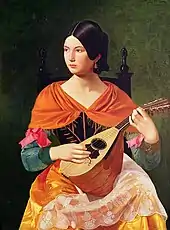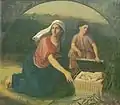
Vjekoslav Karas (19 May 1821 - 5 July 1858) was a Croatian painter, considered a pioneer of a new era of Croatian painting and art in general.
Life
Born in Karlovac, Croatia, Karas was sent to be educated in Italy in 1838.[1] While in Rome, he drew inspiration from biblical and religious themes, painting Mother with Moses on the river bank. While in Italy he developed a love for music and learned to play the flute and the guitar while composing songs in both Italian and Croatian.[1] He began focusing his craft on portraits, painting Roman woman playing a lute and Roman commoner before returning to Karlovac in 1848.[2] Upon his return, he continued painting portraits and began painting local country life and local folk.[1] He moved to Zagreb and began teaching. From 1851-18522 he traveled to Bosnia where he painted a portrait of Ottoman field marshal and governor Omer-paša Latas and his daughter.[3]
Karas suffered periodically from depression and had even attempted suicide.[4] He briefly stayed with bishop Josip Juraj Strossmayer in Đakovo, but left soon after his suicide attempt.[4] Still suffering from depression and living in poverty, Karas committed suicide by drowning in the Korana river in his native Karlovac.[1]
Gallery
 Roman woman playing a lute
Roman woman playing a lute Mother with Moses on the river bank
Mother with Moses on the river bank Child
Child Portrait of Josefine Barac
Portrait of Josefine Barac Portrait of Miško Krešić
Portrait of Miško Krešić Portrait of Ana Krešić
Portrait of Ana Krešić
References
- 1 2 3 4 "Karas, Vjekoslav". Hrvatska enciklopedija, mrežno izdanje. Leksikografski zavod Miroslav Krleža.
- ↑ Bulat-Simić 1948, p. 53.
- ↑ Bulat-Simić 1948, p. 55.
- 1 2 "KARAS, Vjekoslav". Hrvatski Biografski Leksikon. leksikografski zavod Miroslav Krleža.
Sources
- Bulat-Simić, Anka (1948). Vjekoslav Karas. Društvo historičara umjetnosti NRH. Retrieved 20 April 2021.
External links
- KARAS, Vjekoslav at lzmk.hr (in Croatian)
- Rođen Vjekoslav Karas (in Croatian)